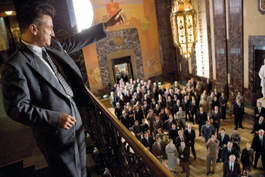home | metro silicon valley index | movies | current reviews | film review

Photograph by Kerry Hayes
Stark Victory: Wille Stark (Sean Penn) blesses the bayou masses in 'All the King's Men.'
Swamped
Robert Penn Warren meets Sean Penn (no relation) in 'All the King's Men,' a Southern tale of domestic fascism
By Richard von Busack
LOUISIANA'S Huey Long was one of the most flamboyant politicians who ever stuffed a ballot box. Steve Zaillian's version of Robert Penn Warren's novel All The King's Men (first put on the screen in 1949) is a thinly veiled version of Long, Willie Stark (Sean Penn). The remake, updated to around 1949 (Long was active in the '30s), has Stark as a small-town treasurer warning against the scandal of cut-rate contractors. He turns out to be tragically right when the fire escape on a local school collapses.
A sinister fixer, Tiny (James Gandolfini), convinces Stark that he could be a candidate for governor. In fact, the machine is using Stark as a way of dividing the hillbilly vote, so that their citified candidate can win. Jack (Jude Law), a reporter covering Stark's campaign, uncovers the ruse.
Stark gets drunk for the first time and decides to be his own man. He transforms himself into a populist governor who builds roads and schools but finances them with corruption and fear. Stark becomes a Southern realpolitiker who justifies his dirtiness with a quote: "Man is conceived in iniquity; he passeth from the stink of the didee [diaper] to the stench of the shroud." Nice line, but if you expected a movie about a dynamic, trickster politician, you'd be wrong. All the King's Men actually gives us a mope who joylessly drinks whiskey from the bottle, nursing his heartbreak while history unfolds around him. Penn's Willie Stark may appear on the poster, but the narrator here is Jack, the sorrowing son of the old aristocracy, who can't forgive his mother (Kathy Baker) for taking serial husbands.
There is one man of honor in Jack's life—Anthony Hopkins, enjoying himself thoroughly as a white-maned judge with a taste for silly toys. All the King's Men begins when Jack makes his first deliberate strike against his class, deciding to take up politics at its most mucky.
The film should have begun in a later flashback of a party with Jack, boyhood chum Adam (Mark Ruffalo) and Anne Stanton (Kate Winslet, hair done long, blonde and straight, with black eyebrows). She's the girl who drove Jack to drink. His literal weakness in her presence goes unexplained. Chronologically, it looks as if Jack was unmanned long before he met Stark.
The supporting cast always seems to be warming up for a great scene, particularly Patricia Clarkson, showing off her attractive arrogance as the midwife of Stark's career. Gandolfini is almost an editorial cartoon for the hoggishness of machine politics, and he looks like a human pork chop in his big fedoras and three-piece suits. What a Stark Gandolfini would have made! But nothing much happens to him after he takes a low-comedy tumble into a pigpen.
All the King's Men is a glum, mourning movie. It gets in a few interesting images of Southern decadence—a dripping ice sculpture of a gator's head at a banquet and a splayed pig spread-eagled on a barbecue grill at a county fair. Still, though the locations are all close to New Orleans, photographer Pavel Edelman makes the settings look as frost-bitten as central Europe; he uses as little color as possible without going to black-and-white.
Take a look at Robert Rossen's original, and it's easy to see where the casting went wrong. The low-budget hit was filmed in our local swamps at Stockton. The star, Broderick Crawford, was a born heavy, a feline-simian fireplug with a widescreen forehead. And he made it clear why the mob fell for him; he was a glad-hander with an orator's voice, with the physical power a good ol' boy would respect.
Penn isn't a powerless actor, but when he harangues the crowd, promising to have the hides of the oil company execs who did everything to Louisiana but refine it, he's just a soap-box crazy. And he doesn't gain in stature by gesticulating under his giant shadow projected on the looming tower of the capitol building in Baton Rouge. (He doesn't connect much with his assistants, either: as an actor, Penn should come with a warning label, "Does Not Play Well With Others.")
When Penn starts croaking out his threats against the sumbitches, the crowd is shown transported, their faces are shining—but the audience may not fall for Stark. They won't feel the dark gravity of fascinating fascism. What they're supposed to applaud is the declining nobility; the way Ruffalo represents the old order by playing his grand piano in his rotting flat, the way composer James Horner beats ersatz Slavic romantic music into the film.
Surveying the rise of domestic fascism in this murky remake, Zaillian investigates the least cinematically interesting aspect of that rise: the problem of how the old guard loses its willpower and leaves the doors open to a conniving political opportunist. James Carville, the shrewd politician who served as exec producer, insists on this story's relevance today. But All the King's Men is more about current political impotence among liberals, who are unable to do much more than bleat in pain as they're rolled over by vigorous immoral demagogues.
![]() All the King's Men (PG-13; 120 min.), directed and written by Steve Zaillian, photographed by Pawel Edelman and starring Sean Penn and Jude Law, opens Sept. 22.
All the King's Men (PG-13; 120 min.), directed and written by Steve Zaillian, photographed by Pawel Edelman and starring Sean Penn and Jude Law, opens Sept. 22.
Send a letter to the editor about this story.
|
|
|
|
|
|